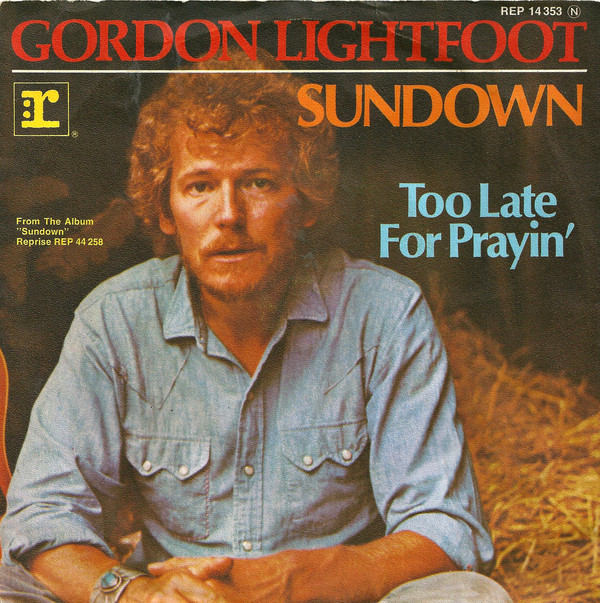In The Number Ones, I'm reviewing every single #1 single in the history of the Billboard Hot 100, starting with the chart's beginning, in 1958, and working my way up into the present.
Gordon Lightfoot - "Sundown"
HIT #1: June 29, 1974
STAYED AT #1: 1 week
Gordon Lightfoot wanted it to be one way, but it was the other way. That's the story of "Sundown," a song about curdled romantic obsession that turned out to be Lightfoot's only American #1 hit. Lightfoot sings the song about a woman, one "who's been looking like a queen in a sailor's dream, and she don't always say what she really means." He's fixated on her, on possessing her. He knows that he's leading himself down a dark path: "Sometimes, I think it's a shame / When I get feeling better when I'm feeling no pain." He spends his nights worrying about catching someone creeping 'round his back stairs. And there's no resolution; he ends the song stuck in that simmering-rage fugue state.
When Lightfoot recorded "Sundown," he'd only just gotten divorced the year before. But Lightfoot didn't write the song about his ex-wife. Instead, the song came out of his long affair with Cathy Smith, the notorious groupie and ex-drug dealer who would later do prison time for shooting John Belushi up with the speedball that killed him. Lightfoot was a jealous guy. Once, while drunk, he reportedly hit Smith hard enough that he broke her cheekbone. There's also a story about Lightfoot firing an opening act from his tour because he thought they were flirting with Smith.
The night Lightfoot wrote "Sundown," he was sitting at home, stressing out. Smith was out at a bar with her friends, and he was worried that she'd hook up with someone else. He put all his most immediate feelings into the song, which he literally wrote as the sun was setting. Years later, Lightfoot called Smith "the one woman in my life who most hurt me." But it sure seems like Lightfoot hurt Smith, too, and that he hurt other people because of his obsession with her. It seems like he hurt himself, too.
"Sundown" is a pretty atypical piece of mid-'70s folk-rock. It's not soft or fluffy or reassuring. Instead, it's ugly and sweaty and driven. That's what's interesting about it. It's one of the reasons why the song works as well as it does. Lightfoot might've been contemporaries with people like John Denver or Cat Stevens, but he carried a darkness that those guys didn't have. We can hear that in the words he wrote for "Sundown": "I can see her looking fast in her faded jeans / She's a hard-loving woman, got me feeling mean." We can hear it in the song's groove, a tense and coiled acoustic shuffle. And we can hear it in Lightfoot's voice, a craggily expressive burr.
Lightfoot sounds all the way pissed off -- at the woman, at anyone she might be creeping with, and perhaps most of all at himself. "I can picture every move that a man would make," he sneers. "Getting lost in her loving is your first mistake." Maybe the "you" is some would-be paramour, but maybe it's Lightfoot singing to himself. More likely, it's both.
Lightfoot had grown up in an Ontario lake town and studied jazz composition in Los Angeles, and he'd returned to Canada in 1960, just before the LA folk scene started to boom. Living in Toronto, Lightfoot started playing folk at local cafés and on the CBC show Country Hoedown. He spent a year in the UK, hosting the BBC's Country And Western Show. Eventually, he made his way as a songwriter. People like Elvis Presley, the Clancy Brothers, and Peter, Paul And Mary covered his songs, and Marty Robbins had a big country hit with a version of Lightfoot's "Ribbon Of Darkness."
Lightfoot got himself signed in 1965 and released his first album a year later. He quickly became huge in Canada, but things took longer in the US. He finally hit with the 1970 single "If You Could Read My Mind," a lament about his disintegrating marriage. ("If You Could Read My Mind" peaked at #5; it's a 9.) From there, Lightfoot spent the rest of the '70s as a genuine star and a Canadian national treasure. This was the era of the sensitive, middle-of-the-road folk-rocker, and Lightfoot turned out to be a rougher, more gnarled alternative to the John Denvers of the world. He had a hell of a run, and he made a lot of beautiful music. But the one time he hit #1, he did it with a song full of ugly sentiments. Great song, though.
GRADE: 9/10
BONUS BEATS: Here's Scott Walker's ecstatically sung, richly orchestrated 1974 cover of "Sundown":
THE 10S: William DeVaughn's effortlessly liquid Philly soul vamp-glide "Be Thankful For What You Got" -- a song about not needing earthly possessions where William DeVaughn sounds really amped about earthly possessions -- peaked at #4 behind "Sundown." It's a 10, and I'm thankful for it.
https://youtube.com/watch?v=KDTXljIqxRE






